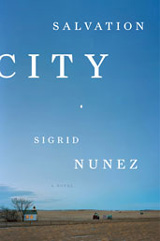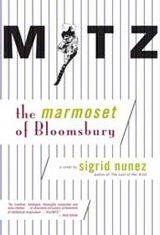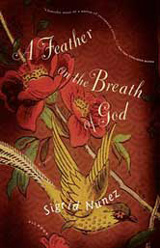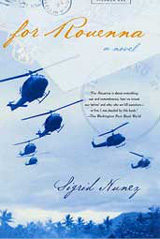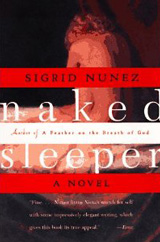
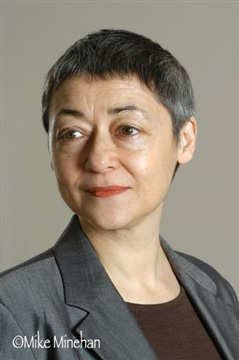
Sigrid Nunez was called a "writer of uncommon talent" by The New York Times Book Review. Of her novel, The Last of Her Kind, Andrew O'Hehir of Salon.com said, "Nunez's piercing intelligence and post-feminist consciousness may well feel that writing the Great American novel is no longer a feasible or worthwhile goal—but damned if she hasn't gone and done it anyway …." Author Gary Shteyngart says, "Sigrid Nunez has long been one of my favorite authors because she writes with the deepest intelligence, the truest heart and the most surprising sense of humor." And The Washington Post exclaims,"Sigrid Nunez nearly transforms literature into ballet."
The award-winning author of five previous novels, Sigrid Nunez's sixth novel Salvation City will be published this month. It tells the coming-of-age story of a young boy who gains refuge from a rapidly unraveling country within the utopian, religious community of Salvation City. Belletrista's Joyce Nickel spoke with Ms. Nunez recently about Salvation City, and about her influences as a writer. It is with great pleasure that Belletrista introduces Sigrid Nunez to our readers.
JN: There has been much in the media the last few years about both pandemics and fundamentalist Christians. Did your idea for Salvation City come from a specific news item, or from somewhere else?
SN: The first idea I had for the novel was the character of Cole Vining, an ordinary, angst-filled American kid.
Then came the need to create a world for him to live and move in, and experiences for him to go through, and people for
him to relate to—in other words, I had to create a story. And then came a series of what-ifs. Although I began writing
the book two years before the swine flu outbreak of 2009, we've all known for a long time that a flu pandemic like
the one that convulsed the world in 1918 could strike again at any time. And I thought, What if this were indeed to
happen, and what if, like many children during the 1918 flu, Cole ended up losing his parents? And what if he ended
up in an orphanage and was then taken in by people totally different from those he'd grown up with—people who believed
pretty much the opposite of what his parents believed?
JN: The description on the back cover of the book makes it sound to me like dystopian literature, and you participated in the dystopian panel at the recent BookExpo America. However, I don't find any of the hallmarks of traditional dystopian literature (elements such as: a protagonist under threat of negative action from a more powerful arbitrary force; a dangerous and alienating future society that is marked by deprivation, oppression and terror, and that criticizes current trends in culture; a warning of the dangers of some current trend; totalitarianism). I've heard you describe it as a "temporary dystopia." What do you mean by that term and how do you see the society depicted in Salvation City as dystopic, given that it is a skeleton of itself rather than a society that is fundamentally different?
SN: The dictionary definition of dystopia is "a hypothetical place, society, or situation in which conditions
and the quality of life are dreadful." That certainly describes the way things are during and for some time after
the pandemic at the heart of my novel, and so, though it doesn't fit squarely into the genre of traditional
dystopian literature I can see why the organizers of the panel at BookExpo wanted to include it. I say temporary
because, although the flu does terrible things to the world, it does not destroy it. Once the outbreak passes,
society can be seen beginning to right itself. Which is of course also what happened historically, after the
Great Flu of 1918. For that reason Salvation City isn't a post-apocalyptic novel, either, though I have
seen it called that. Nor is it a futuristic or science fiction novel; as can be seen from various cultural
references and from the technology that appears in the book, the time is recognizably the immediate future and
not many years from today. Also, I should say that, though not your usual dystopic story, Salvation City does
explore ways in which a catastrophe like a lethal pandemic could threaten to bring about the kind of "dangerous and
alienating future society" you list as a hallmark of the genre, one that might not be temporary at all.
JN: Salvation City seems to be very different from your earlier novels. What prompted you to go off in a new direction?
SN: In fact, my six novels are all quite different from one another. When I start a new novel, I always like
to do something new. In this particular case, I wanted to write a novel in which the main character was male rather
than female, and I also wanted to set much of the story in the near future—two things I hadn't done in my
fiction before. And then I decided to make the main character an adolescent rather than an adult, which was also
something new for me. I liked the idea of getting into the head of someone who wasn't yet fully formed and
exploring how he grew.
JN: What was your inspiration for these characters?
SN: None of them is based on any real person. Unlike some of the characters in my other books, all the
characters in Salvation City are completely made up, and everything that happens to them has been invented.
JN: Did any of the characters become a particular favourite of yours?
SN: During the period when I'm actually writing, every character becomes a kind of favourite because of all
the time I have to spend trying to make him or her as real as possible. Once a book is finished, though, usually
the characters become distant; I'm on to other things. But in this case, I did find that Cole, whom I loved very
much, stayed with me. I think that's a way of saying I miss him.
JN: Why did you make the protagonist, Cole, a male character?
SN: As I say, I wanted to write about a main character who was male because it was something I hadn't done
before. It was a decision I made even before I started writing the book.
JN: Due to the effects of the flu, Cole has trouble remembering his past, and his new family want to ignore that past. To me, this was one of the most insidious (or perhaps unsavory) characteristics of Pastor Wyatt and Tracy, who were otherwise kind and quite reasonable. What was your motivation for making these characters deny Cole his grieving and healthy psychological development?
SN: A novelist must always be true to his or her characters, and this often means having them behave not
as one might wish them to behave but as is consistent with their own personalities. In the case of Pastor Wyatt
and Tracy, we're talking about people who believe that the End Time is near. They believe quite literally in what
the Bible says about the fate of all mankind. They love Cole, and they want to protect him from anything that
might put his conversion and salvation at risk. Of course this means cutting him off from his atheistic roots.
And since they know it's too late for his parents, now among the unsaved dead, it's understandable that they'd
encourage him not to dwell on their horrific fate. The stakes couldn't be higher, and their religious conviction
simply will not allow them to see that they could possibly be doing Cole anything but good.
JN: Most people—in North America, at least—-have encountered wacky fundamentalist Christians in the media and on the internet. It seems that a post-flu, near Apocalypse society could be ripe for the growth of extremest sects. Yet your portrayal of evangelical Christians was sympathetic. Why did you choose to go this route?
SN:Wacky Jesus freaks make great subjects for satire, but Salvation City isn't a satirical novel. My evangelical
Christians are exactly like people I've encountered in real life, meaning they have different sides to them, some of
which I like and some of which I sure as hell don't. To me, Pastor Wyatt and Tracy are in many ways quite
unsympathetic, for example in their lack of intellectual curiosity and their general ignorance and mindless
bigotry. But in life I've almost always discovered that when I really pay attention to a person, even if it's someone
whose way of thinking I abhor, I find something that touches me, some fellow feeling that makes me want to get along
with that person—or at least not reject them. And I don't want to be rejected by them, either. And for me, as a writer,
it's always been more interesting to create round characters rather than flat ones, partly because those are the kinds
of characters I myself would rather read about.
JN: Readers are often fascinated by how authors work. Do you plan your novels before you start to write, or do you just write and see where you go?
SN: I'm one of those authors who doesn't plan or make outlines or even many notes before I start. In fact, I'd
rather know as little as possible about what's going to happen beforehand. It's much more exciting for me not to know,
my imagination has to work harder that way, and I like the feeling that whatever happens in the book has a chance
to grow organically out of what has come before.
JN: When did you start writing and what inspired you to continue?
SN: Like most writers, I started writing when I was very young. What inspired me was reading. I was a big
reader as a kid, and I was so easily seduced by a good story and so enamored of good writers that it became my dream
to grow up to write stories one day, too. And it's still reading that does it for me. It's to other writers I turn
for inspiration and encouragement to go on.
JN: What styles of writing inspire you? Do you have favourite authors or works?
SN: I'm inspired by any kind of writing that I find beautiful, though I'd say I'm particularly drawn to a
spare, restrained, even ascetic prose style. And though I had a list of favourite writers when I was younger—writers
like Dickens and Flaubert and Chekhov and Woolf—I find that this has changed. There's so much great work out there,
and for me the list of most beloved just keeps growing and changing all the time.
JN: Which writers most influenced your development as a writer?
SN: I've mentioned Woolf, and I should mention also Elizabeth Hardwick, with whom I studied in college and
who also happened to be the first professional writer I ever met. However, she was a far greater influence on me
through her wonderful writing than she was as a creative-writing teacher. Even more important to me was Susan Sontag,
who was not a professor of mine but who was a mentor and about whom I've written a short memoir, which is coming out
next spring. Of course, I don't write like any of these women, but I doubt that I would have developed as I did
without them. I also believe that every writer I've ever read seriously has had an influence on my writing, and that
this will always be true. Which is why, whatever sacrifice I might be willing to make for my writing, reading would
never—could never—be one of them. One thing that was drilled into my head by both Hardwick and Sontag was You must
read everything. And both of them shared Woolf's vision of heaven as eternal reading.
Interested readers can read Ms. Nickel's review of Salvation City here.
More can be read about Sigrid Nunez and her books at her website www.sigridnunez.com
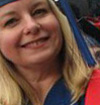
Joyce Nickel is a corporate writer from Vancouver, Canada. When she's not reading or traveling, she can
be found enjoying the outdoor lifestyle of the Pacific Northwest.
